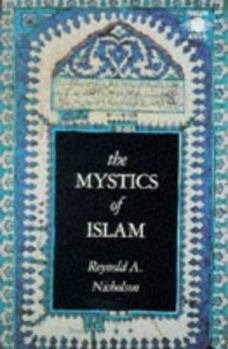The Mystics of Islam
Select Format
Select Condition 
Book Overview
A classic and definitive introduction to the message of Sufism. This description may be from another edition of this product.
Format:Paperback
Language:English
ISBN:0140191682
ISBN13:9780140191684
Release Date:June 1990
Publisher:Penguin Group
Length:192 Pages
Weight:0.35 lbs.
Dimensions:0.5" x 5.0" x 7.7"
Customer Reviews
3 ratings
Intro to Sufism
Published by Thriftbooks.com User , 15 years ago
First published in 1914, Dr. Nicholson has a deep grasp of his subject, but perhaps the depth sometimes get in the way for a reader like me trying to get initial exposure. The introduction deals more with possible influences (such as Christianity, Neoplatism, and Buddhism) on the mystic, and less on basic expressions of beliefs. Throughout the book, and particularly the final chapter "Unitive State" commonalities with Hinduism and Buddhism are included,. The Sufi "Look in your own heart, for the Kingdom of God is within you", sounds very much like Matthew .... "The kingdom of God is within you". The use of quotes are well done such as from the Qu'ran "Worship God as though thou sawest Him, for if thou seest Him not, yet He sees thee.". The whole of Sufism rests of the belief that when the individual self is lost, the Universal Self is found, and particularly inclusion of poems by Jalaluddin Rumi highlight that: "Men incur the reproach of wine and drugs \ That they escape for a while from self-consciousness, \ Since all know this life to be a snare". The chapters on Gnosis and Divine Love, are perhaps the most esoteric and most universal Ibn al_Arabi "My heard has become capable of every form: it is a pasture for gazelles and a convent for Christian monks,". At some point in understanding the Sufi quest of reality
Origin, Character and Historical Analysis of Sufism
Published by Thriftbooks.com User , 15 years ago
"I propose to offer a few remarks on the origin and historical development of Sufism, its relation to Islam, and its general character. Not only are these matters interesting to the student of comparative religion; some knowledge of them is indispensable to any serious student of Sufism itself." R. A. Nicholson Roots of Sufism: It is obvious that the ascetic and quietistic tendencies to which Nicholson has referred were in harmony with Christian mystical theology and drew nourishment therefrom. He advocates, "Many Gospel texts and apocryphal sayings of Jesus are cited in the oldest Sufi biographies, and the Christian anchorite (rahib) often appears in the rôle of a teacher giving instruction and advice to wandering Moslem ascetics. We have seen that the woollen dress, from which the name 'Sufi' is derived, is of Christian origin: vows of silence, litanies (dhikr), and other ascetic practices may be traced to the same source." Sufism Mystical Milieu: Nicholson suggests that the conspicuous place occupied by the influence of gnosis in early Sufi speculation suggests contact with Christian Gnostics, and it is worth noting that the parents of Ma`ruf al-Karkhi, whose definition of Sufism as 'the apprehension of divine realities' was quoted on the first page of this Introduction, are said to have been Sabians, i.e. Mandæans, dwelling in the Babylonian fenland between Basra and Wasit. He affirms that the early Sufis borrowed from the Manichæans the term siddiq, which they apply to their own spiritual masters. Now, since the Arabs encountered Aristotle philosophy from his Neoplatonist commentators, like Yehya Al-Nahawy (John Philoponus), Nicholson debated that the system with which they became imbued was that of Porphyry and Proclus, concluding "the so-called Theology of Aristotle, of which an Arabic version appeared in the ninth century, is actually a manual of Neoplatonism." Another major work of Neoplatonic core, attributed to pseudo-Dionysius the Areopagite, who may have been a Syrian monk, identified with Stephen Bar Sudaili, a prominent mystic and a contemporary of Jacob of Saruj in late fifth/ sixth century. Dionysius quotes a complete work, the Book of Hierotheus on the Hidden Mysteries of the Divinity. The Dionysian writings, including "The Divine Names," turned into Latin by John Scotus Erigena, and influenced Western Mystics greatly, was adopted as The 99 beatific Names of God. The Book on Sufi Path: This compelling work was written in 1914 by the eminent British orientalist, scholar of Islamic literature and Sufism, and one of the greatest Rumi specialists and translators into English. This serious work, still in print after 95 years, exposes in six chapters in plain English the Sufi roots and path, with amazing quotations by a poetical writer who taught Arabic and Pharsi. After a masterful informative introduction, he takes the reader on an illuminating tour of the Sufi Path, Illumination and Ecstacy, The Gnosis, Divine Love, Saints a
Brilliant !
Published by Thriftbooks.com User , 24 years ago
This book is a must for anyone interested in spiritual tradition. It shows that Islam Suffis have come to conclusions similar to those in famous Taoist Yoga and in the Kabbalah. Please read the book more than once - it deserves it !






